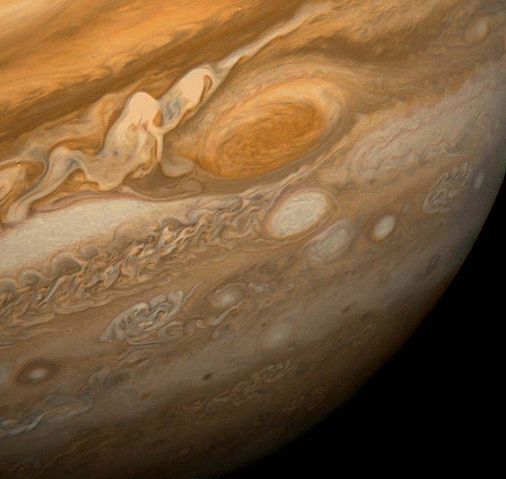 |
This is a file from the Wikimedia Commons. Information from its description page there is shown below.
Commons is a freely licensed media file repository. You can help.
|
Summary
| Description |
English: The Great Red Spot as seen from Voyager 1 This dramatic view of Jupiter's Great Red Spot and its surroundings was obtained by Voyager 1 on February 25, 1979, when the spacecraft was 5.7 million miles (9.2 million kilometers) from Jupiter. Cloud details as small as 100 miles (160 kilometers) across can be seen here. The colorful, wavy cloud pattern to the left of the Red Spot is a region of extraordinarily complex and variable wave motion. To give a sense of Jupiter's scale, the white oval storm directly below the Great Red Spot is approximately the same diameter as Earth.
Suggested for English Wikipedia:alternative text for images: quarter view of Jupiter with the Great Red Spot at middle top as orange oval within a turbulent belt of wavy clouds. Below the Great Red Spot are various bands of turbulent clouds with smaller spots: some pale cream, others dark brown.
Français : La grande tache rouge de Jupiter vue par Voyager 1 le 25 février 1979, d'une distance de 9,2 million de kilomètres. Les plus petits détails visibles font 160 km environ. La zone colourée et ondulante à gauche de la tache correspond à une région ayant des mouvements très complexes et variables. L'ovale blanc juste en dessous de la grande tache rouge a le même diamètre que la planète terre.
|
| Date |
25 February 1979 |
| Source |
http://photojournal.jpl.nasa.gov/catalog/PIA00014 |
| Author |
NASA |
 |
Valued image
This image has been assessed under the valued image criteria and is considered the most valued image on Commons within the scope: Great Red Spot. You can see its nomination at Commons:Valued image candidates/Great Red Spot From Voyager 1.jpg.
|
Licensing
| Public domainPublic domainfalsefalse |
 |
This file is in the public domain because it was solely created by NASA. NASA copyright policy states that "NASA material is not protected by copyright unless noted". (See Template:PD-USGov, NASA copyright policy page or JPL Image Use Policy.) |
|
|
|
Warnings:
- Use of NASA logos, insignia and emblems are restricted per US law 14 CFR 1221.
- The NASA website hosts a large number of images from the Soviet/ Russian space agency, and other non-American space agencies. These are not necessarily in the public domain.
- Materials based on Hubble Space Telescope data may be copyrighted if they are not explicitly produced by the STScI. See also {{ PD-Hubble}} and {{ Cc-Hubble}}.
- The SOHO (ESA & NASA) joint project implies that all materials created by its probe are copyrighted and require permission for commercial non-educational use.
- Images featured on the Astronomy Picture of the Day (APOD) web site may be copyrighted.
|
File usage
The following pages on Schools Wikipedia link to this image (list may be incomplete):






